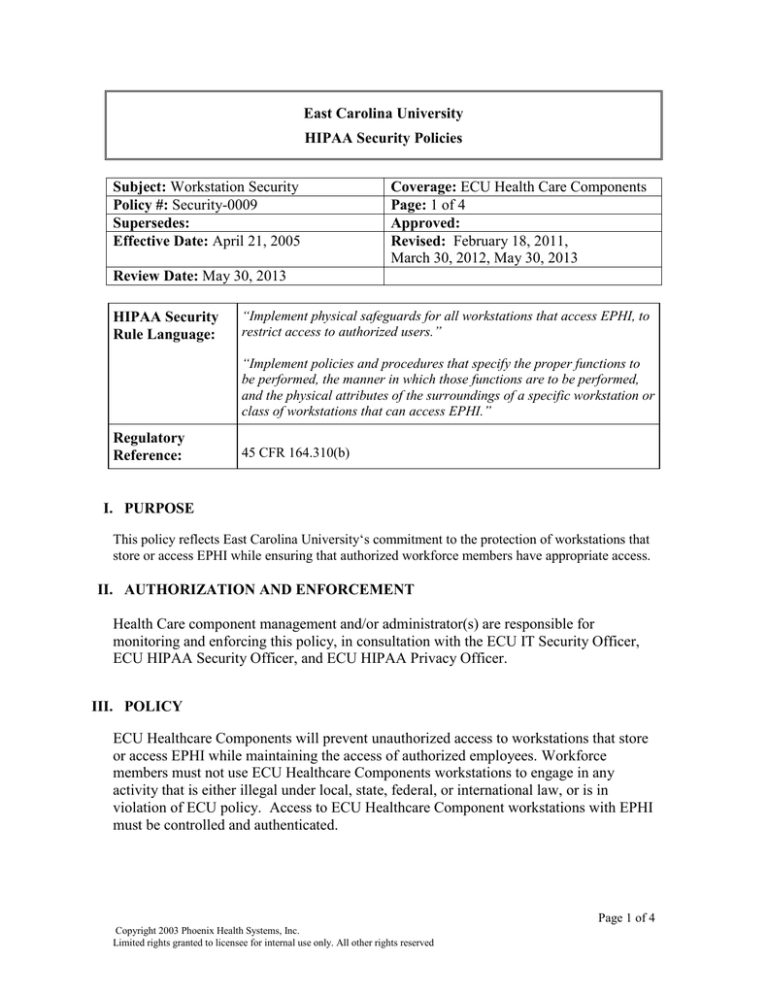
East Carolina University
HIPAA Security Policies
Subject: Workstation Security
Policy #: Security-0009
Supersedes:
Effective Date: April 21, 2005
Coverage: ECU Health Care Components
Page: 1 of 4
Approved:
Revised: February 18, 2011,
March 30, 2012, May 30, 2013
Review Date: May 30, 2013
HIPAA Security
Rule Language:
“Implement physical safeguards for all workstations that access EPHI, to
restrict access to authorized users.”
“Implement policies and procedures that specify the proper functions to
be performed, the manner in which those functions are to be performed,
and the physical attributes of the surroundings of a specific workstation or
class of workstations that can access EPHI.”
Regulatory
Reference:
45 CFR 164.310(b)
I. PURPOSE
This policy reflects East Carolina University‘s commitment to the protection of workstations that
store or access EPHI while ensuring that authorized workforce members have appropriate access.
II. AUTHORIZATION AND ENFORCEMENT
Health Care component management and/or administrator(s) are responsible for
monitoring and enforcing this policy, in consultation with the ECU IT Security Officer,
ECU HIPAA Security Officer, and ECU HIPAA Privacy Officer.
III. POLICY
ECU Healthcare Components will prevent unauthorized access to workstations that store
or access EPHI while maintaining the access of authorized employees. Workforce
members must not use ECU Healthcare Components workstations to engage in any
activity that is either illegal under local, state, federal, or international law, or is in
violation of ECU policy. Access to ECU Healthcare Component workstations with EPHI
must be controlled and authenticated.
Page 1 of 4
Copyright 2003 Phoenix Health Systems, Inc.
Limited rights granted to licensee for internal use only. All other rights reserved
HIPAA Security Policy # 0009: Workstation Security
IV. APPLICABILITY
This policy is applicable to all workforce members who use, are responsible for, or
otherwise administer a healthcare computing system. A healthcare computing system is
defined as a device or group of devices that store EPHI which is shared across the
network and accessed by healthcare workers.
V. PROCEDURE
The following standards and safeguards must be implemented to satisfy the requirements
of this policy:
1. ECU Healthcare Components must prevent unauthorized physical access to
workstations that can access EPHI and ensure that authorized workforce members have
appropriate access.
2. All workforce members who use ECU Healthcare Component workstations must take
all reasonable precautions to protect the confidentiality, integrity, and availability of
EPHI contained on or accessed by the workstations. For example, positioning monitors or
shielding workstations so that data shown on the screen is not visible to unauthorized
persons.
3. Unauthorized ECU Healthcare Components workforce members must not willfully
attempt to gain physical access to workstations that store or access EPHI.
4. ECU Healthcare Component workforce members must report loss or theft of any
access device (such as a card or token) that allows them physical access to areas having
workstations that can access EPHI.
5. Access to all ECU Healthcare Component workstations must be authenticated via a
process that includes, at a minimum:
Unique user IDs that enable users to be identified and tracked.
Passwords must be masked, suppressed, or otherwise obscured so that
unauthorized persons are not able to observe them.
The initial password(s) issued to a new ECU Healthcare Components workforce
member must be valid only for the new user's first logon to a workstation. At
initial logon, the user must be required to choose another password
Upon termination of workforce member employment or contracted services,
workstation access privileges will be removed.
6. ECU Healthcare Component workforce members must not share their user accounts or
passwords with others. If a workforce member believes that someone else is
inappropriately using a user account or password, they must immediately notify their
manager.
Page 2 of 4
Copyright 2003 Phoenix Health Systems, Inc.
Limited rights granted to licensee for internal use only. All other rights reserved
HIPAA Security Policy # 0009: Workstation Security
7. Anti-virus software must be installed on workstations to prevent transmission of
malicious software. Such software must be regularly updated.
8. ECU Healthcare Component workforce members must activate their workstation
locking software whenever they leave their workstation unattended. ECU Healthcare
Component workforce members must log off from or lock their workstation(s) when their
shifts are complete.
9. Connections from a workstation to a healthcare computing system must be logged off
after the session is completed.
10. Special precautions must be taken with portable workstations such as laptops and
personal digital assistants (PDA). At a minimum the following guidelines must be
followed with such systems:
EPHI must not be stored on portable workstations unless such information is
appropriately protected. If EPHI is stored on the portable device, it must be
encrypted.
Locking software for unattended laptops must be activated.
Portable workstations containing EPHI must be carried as carry-on (hand)
baggage when workforce members use public transport. They must be concealed
and/or locked when in private transport (e.g., locked in the trunk of an
automobile).
11. For workstations with EPHI stored locally on hard drives or other memory devices,
additional security measures are required. At a minimum these requirements include:
Approval from the Director of Health Information Systems/Services must be
acquired prior to storing EPHI on workstations or devices external to the
Healthcare Components’ existing computer system. ECU Healthcare Components
must contact the Director of Health Information Systems/Services to identify any
database or application that will store electronic protected health information.
HIS/S will determine if the application or database is legitimate or if it is a
duplicate system. If approval is granted, the University HIPAA Security Officer
will review the security controls against the HIPAA Security requirements.
ECU Healthcare Component must inventory and document EPHI stored on
workstations when first installed and at least on an annual basis thereafter.
ECU Healthcare Component must review and document the security safeguards
related to the protection of EPHI stored on their workforce member workstations.
Data files containing EPHI will be encrypted wherever possible and password
protected.
12. Report theft of all devices to the ECU Police immediately.
If the database or application will reside on a portable device, adherence to ECU
Workstation Security Policy, #0009, and Healthcare Workforce Acceptable Use Policy,
#0016, are required.
Page 3 of 4
Copyright 2003 Phoenix Health Systems, Inc.
Limited rights granted to licensee for internal use only. All other rights reserved
HIPAA Security Policy # 0009: Workstation Security
VI. COORDINATING INSTRUCTIONS
1. All section policies, standards and procedures will be reviewed annually. Every
section policy, standard and procedure revision/replacement will be maintained for a
minimum of six years from the date of its creation or when it was last in effect,
whichever is later. Other East Carolina University, University of North Carolina
system, or state of North Carolina requirements may stipulate a longer retention.
Page 4 of 4
Copyright 2003 Phoenix Health Systems, Inc.
Limited rights granted to licensee for internal use only. All other rights reserved


